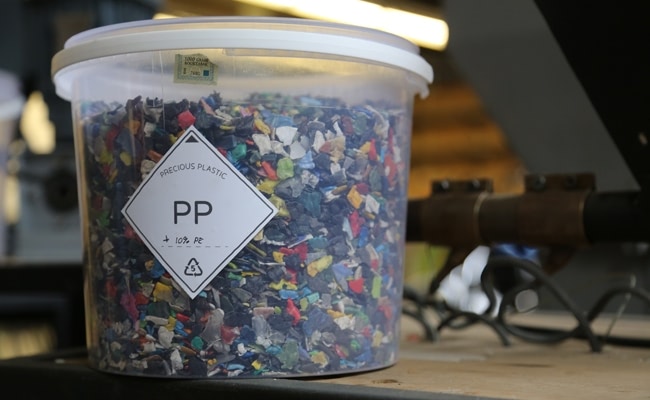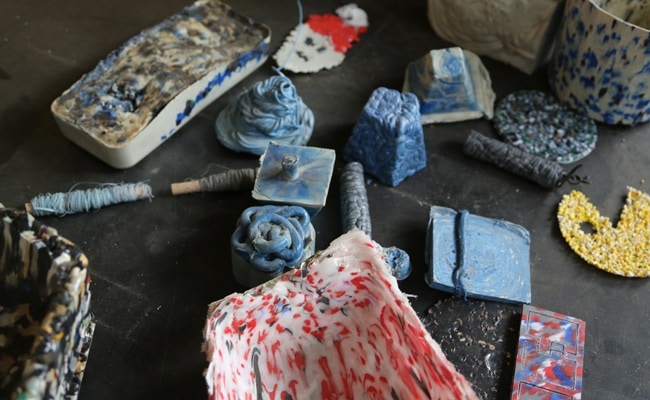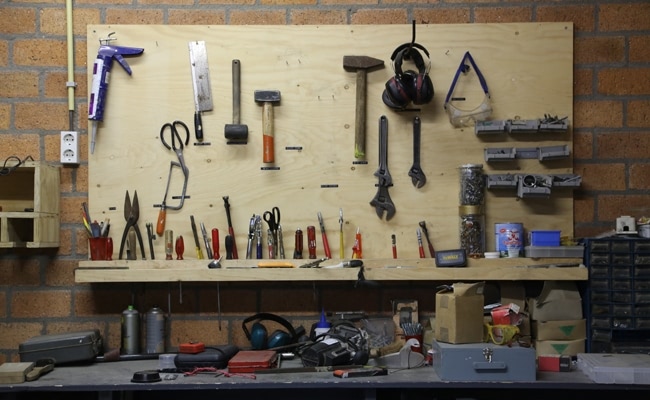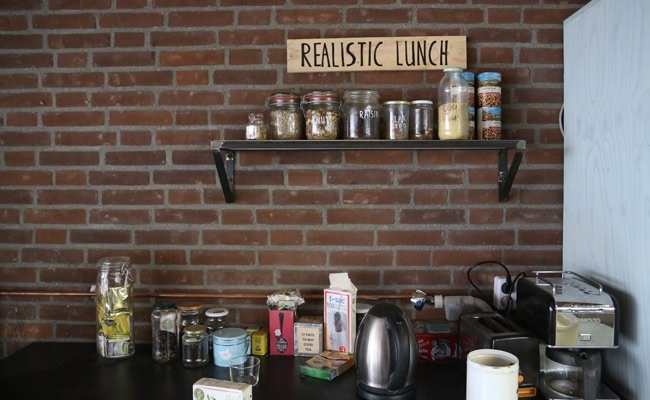We recently assigned this year’s ECO Coin Award to Dutch designer Dave Hakkens, founder of the Precious Plastic movement. With his open-source recycling machines, he gives people around the world the knowledge to locally start recycling plastic. We visited Hakkens' studio, where we spoke about recycling, mobile phones, traveling and sustainability.
Dave Hakkens graduated cum laude at the Design Academy Eindhoven in 2013. His graduation project Phonebloks gained international media attention, which resulted in Google's interest to develop the mobile. In the same year he won the Social Design Talent Award and a commission to implement and further develop his Precious Plastic project. Initially trained as an industrial designer, Hakkens spends his time building machinery, making videos and creating his own community.
The idea for Precious Plastic was simple: getting people to recycle plastic
When was the first time you became aware of recycling?
Since I was younger I've always been amazed by metal; seeing homeless people collecting cans from the streets, bringing them to a designated point and exchange them for money. I became aware of how something we consider trash can generate value. Gradually I understood the metal working process and started seeing it as a material. Today I still work along these lines. It is up to us to make something out of it, and plastic seemed like an interesting medium when I started the Precious Plastic project.
Can you update us on the status of Precious Plastic?
The idea for Precious Plastic was simple, getting people to recycle plastic and so I developed these machines. After the project ended, a few people started building them themselves, but only on a small scale. Therefore I decided to create a second version, which was launched six months ago. I already received constructive feedback on the project. People started building their recycling machines from Mexico to Hungary, from Indonesia to South Africa and Australia. However, as there is not a recycling machine in every village in the world yet, we are already thinking about building a third version.
At the moment there are people who have the resources for a machine, but don’t know how to make one. At the same time, there are people who want to build a machine, but don’t know anyone who would want one. Sometimes it’s a matter of bringing these two people together, which locally can create a building scenario. This is an interesting point to consider in the development of the third version, to smoothen the building process by offering a map where you can see where the builders and the plastic are located.

Was this the starting point for your community?
This initially started as the Phonebloks community, where others were invited to contribute to the project. Building a community is very valuable to me. At some point I created a community for Precious Plastic and decided to bring it all together. Even though it is still a work in progress, I learn and gain much from it. The idea was to build an ongoing forum for people to meet, but also be able to develop their own projects.
Upon our arrival, you mentioned you had just returned from a long travel, how does traveling influence your work?
When traveling I think its more interesting to visit the slumps in India rather than seeing a temple. By visiting the slumps I get an actual insight to how they deal with plastic, which inspires me a lot. As my work often deals with global problems – from e-waste to plastic – I feel it is important to understand how the world works and to ask myself what does it mean on a global scale. I am not saying I comprehend the world completely, but traveling helps me understand it better. Next to that, I travel to meet the people who built my machines and invited me over. For example, in Indonesia I experienced how the machines work in their environment, while simultaneously being able to help them solve the problems they were facing in process.
What kind of problems?
To my surprise they had difficulties in finding an engine. You would think a motor is such a basic part of equipment, but people in Indonesia had trouble getting one. Another problem was that some of people that were able to build the machine didn't know what to do with the material – a bit similar to what is happening in the 3D printing world now. I could never foresee problems like these, it is interesting for me to think about how to improve these aspects.

How do you think technology can contribute to further recycling?
A big part of the project currently resides in developing countries, as there is a lot of plastic waste. The project feels more urgent in a place like that, as people are in direct contact with it. Whereas here, we hide our waste in trashcans, it’s not really visible. To that extent, I think it would be great to see places like these becoming more technologically advanced, having robots grinding and disposing of materials. I imagine this as a friendly place, very often waste processing stinks and it's dirty by nature. It would be great to see a clean place where materials are carefully sorted. Perhaps this would be integrated in version number 12.
You once said you are “trying to make the world better by making things” does this still count?
This is the main motive behind my work. Although I would say I have mixed feelings about it right now. On one hand, this is how I judge the quality of my projects, by asking myself if it's going to make the world better, otherwise I will simply not do it. On the other hand, I am aware that it sounds a bit corny, as it's a common thing to say. I do believe that everybody lives to make the world better in its own way. However, I don’t use that motto anymore, as nowadays the Silicon Valley adopted it to sell apps of any kinds.
Building a community is very important to me
This brings us to Phonebloks, your proposal for a modular phone to reduce e-waste. How did you feel when Google contacted you to develop the phone?
At that time I hoped the project could develop into something more than just an idea, but I never thought multinational mobile phone companies would have taken me seriously. I started wondering what would happen if I could reverse this logic and create a proposal for a socially constructed phone, after which the industry could follow the consumer demand. The idea went online with the outlook that everybody would have been able to make it themselves. That’s when companies picked up the project and Google was one of them. They even offered me a job, but it was never my ambition to work in a mobile phone department. Besides that, I didn’t want Google to make these phones exclusively, as I created it to be accessible for the whole mobile industry.
And then Google pulled the plug…
Yes. Let me start by saying that a lot of people initially thought Phonebloks was Project Ara, because of the scope of the project. Google spent a lot of time working on that project. Every time I visited them, they showed me the development of the prototypes, which resulted in a working modular phone. They even had designers working on modular speakers and such. It was a good learning curve for me to experience how a tech giant like Google handles their business. I do think it will be a matter of time another company continues the project. LG and Motorola are already offering their modular phone versions, so you see it is slowly evolving.

You just celebrated the one-year anniversary of Story Hopper, in which the story becomes more important than the physical product. Where do you see the role of the designer in regard to storytelling?
I started Story Hopper to explore an alternative way of working. I don’t necessarily think each idea needs a product to become a project. For example, I often get compared to Bas van Abel (Fairphone), both Dutch and both working with phones. However, in the Fairphone case the physical product was really needed, while with Phonebloks the video was enough. I think in general storytelling can be part of a project, but not everything. Things still have to be made, or improved even.
I believe that everybody lives to make the world better in its own way
To what extent do you find sustainability in other projects?
The problem is not so much in not-having sustainable items, but it's grounded in the idea of us not using them in a sustainable way. We throw them away not because they are broken, but because of the rapid pace of new products. To me, this is an important aspect in design, to challenge the current mindset. This is the general outline for Story Hopper. I am not making things, but I am exploring ways that are aimed to show people what else is possible.
What are the reactions to your work?
With a project like Phonebloks you have to take into account that almost everybody owns a mobile phone, and it is easy to relate to this project. While the plastic topic is more for a niche group, not many people are concerned about material assimilation. For instance, Precious Plastic is a smaller scale project with fewer views on the Internet. However, I do notice that in the places I visited in Indonesia, India and Nepal, people were aware of it. Seeing that project ended up with the right people, really touched me. The accessibility of the project helped people to illustrate what they are working on to their inner circles. Making it more tangible and show what the plastic waste possibilities are.

Do you want to share some of your future plans with us?
I would like to work on a bigger project and challenge myself even more to see what I can do by myself, as I don’t really have a regular team around me. At the moment I am interested in fashion and food design, although I am not sure what will come out of it. It occurs to me that in fashion there is this idea of humans creating it, every season over again. This system could use some changes. But these are just two topics of interest for now, I will see where to go from there.
Thank you so much, Dave, for sharing your work and viewpoints with us!
Cover photo by Xiaoxiao Xu.
More interviews: Liam Young, Bruce Sterling, Jason Silva, Arne Hendriks, Rachel Armstrong, Alexandra Daisy Ginsberg, Floris Kaayk, Chloé Rutzerveld, Nadine Bongaerts, Mike Thompson and Susana Cámara Leret, Pauline van Dongen, Leanne Wijnsma.

Share your thoughts and join the technology debate!
Be the first to comment